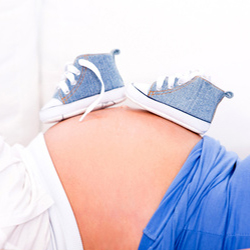Experiencing infertility?

Have you been trying to get pregnant for several months with no success? If so, it may be time to consult a fertility doctor at Arizona Reproductive Medicine Specialists. We can guide you to the most effective fertility treatments for your needs with flexible financing options and attentive, personalized care.
Couples wanting to get pregnant can help increase their chances by making smart choices
Even if you aren’t having fertility issues, it may take up to a year to get pregnant under normal conditions. Clinical infertility can further complicate the process and create extra stress as you try to conceive, so it’s important to know how to improve the chances of pregnancy by maintaining ideal conditions for conception. Below you will get a closer look at some of the factors that can boost fertility in both healthy couples and those struggling with infertility.
Nutritional balance
Most moms-to-be know that prenatal nutrition is important even before conception, because a healthy diet can help prepare the body to create a more hospitable environment for a growing baby.
There is no “fertility diet,” but a well-balanced diet is important for both the female and the male when trying to get pregnant. Women with polycystic ovary syndrome (PCOS) may find a low-carbohydrate diet helpful.
Folic acid is an essential nutrient prior to conception that will help prevent certain serious birth defects. But women may not get enough of it from food sources like eggs and spinach. Therefore, folic acid supplements or prenatal vitamins may be necessary to ensure a good balance.
High levels of caffeine, which is about three cups of coffee daily, may decrease fertility and increase the risk of having a miscarriage.
Lifestyle choices can help in getting pregnant
Cigarettes and alcohol are detrimental for male and female fertility, so both partners should consider kicking the habits of drinking and smoking well before pregnancy is achieved. This will not only improve fertility but it can also make it easier to stay on track with healthy habits once conception does occur.
Women should exercise moderately, as too much exercise can suppress ovulation. A 45 minute or less cardio workout five days a week is a good limit. Moderate exercise also reduces stress.
Take measures to reduce stress, because stress can interfere with ovulation. Factor in down time, try yoga, meditation, acupuncture, whatever brings stress levels down.
Maintaining a healthy weight is crucial. Obesity increases infertility in men and women. Being overweight or being underweight also decreases fertility in women.
Frequent sex during peak ovulation
Women trying to get pregnant should be very familiar with their menstrual cycles. There are many different smartphone apps now available to track cycles conveniently and know when ovulation is taking place.
Using an ovulation predictor kit will also be helpful for recognizing the time of the month when fertility is at its peak. Men may need to control their body temperatures, too, by wearing boxers instead of briefs and avoiding excessive heat near the testicles for an optimal sperm count.
Intercourse at least twice a week increases chances of getting pregnant. And intercourse before, rather than after, ovulation is best. Having sex every day or two during midcycle can increase your chances of success.
Some lubricants negatively affect sperm health. If a lubricant is used, the American Society for Reproductive Medicine recommends products with a hydroxyethylcellulose base, canola oil and mineral oil.
Questions?
Call us at (602) 351-5327 or schedule an appointment below. Let’s talk.
Book Appointment Now

